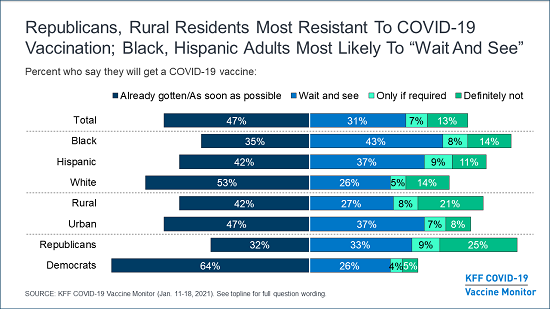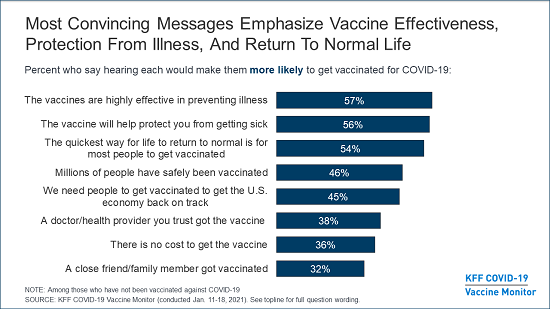
The independent source for health policy research, polling, and news.
Vaccine Monitor: Nearly Half of the Public Wants to Get a COVID-19 Vaccine as Soon as They Can or Has Already Been Vaccinated, Up across Racial and Ethnic Groups Since December
People Who Know Someone Who Has Been Vaccinated are More Eager to Do So Themselves
Most Convincing Messages to Promote Vaccination Highlight Effectiveness at Preventing Illness and a Return to Normal Life; Hearing about Rare Allergic Reactions and Side Effects May Discourage Some
New KFF Dashboard Features Key Data and Insights from the Vaccine Monitor
With millions of Americans getting their first COVID-19 vaccinations, the public’s eagerness to get a vaccine is rising across racial and ethnic groups, though Republicans and rural residents remain the most reluctant groups, the latest KFF COVID-19 Vaccine Monitor reports.
Based on a survey fielded just before President Biden took office, the latest Monitor report shows nearly half (47%) of the public want to get the vaccine as soon as they can or have already been vaccinated. That is significantly higher than the third (34%) of the public in the most-eager “as soon as possible” category in December.
An additional 31% say they want to “wait until it has been available for a while to see how it is working for others” before getting it themselves. One in five (20%) are more reluctant to get vaccinated, including 7% who say they will only get the vaccine “if required to do so for work, school or other activities,” and 13% who say they will “definitely not” get it.
The share who have already been or want to get vaccinated “as soon as possible” is up among Black, Hispanic, and White adults, though White (53%) adults remain more likely than Black (35%) and Hispanic (42%) adults to say so. Black (43%) and Hispanic (37%) adults are more likely than White adults (26%) to say they want to “wait and see” before getting vaccinated.
Similarly, there has been a shift toward greater enthusiasm for getting vaccinated across urban, suburban, and rural areas, though rural residents remain most hesitant. Democrats and independents also show increased enthusiasm, though Republicans’ views are little changed since December.
The Monitor shows that Republicans and rural residents are now the groups most likely to say they either definitely won’t get a vaccine or would only do so if required.
Data and analysis related to vaccine acceptance and hesitancy, trusted messages and messengers, demographic breakouts, and people’s experiences, are now featured in a new dashboard for the Monitor. The dashboard will be updated regularly to reflect the latest data and current issues, including an upcoming report on people’s sources of information related to the COVID-19 vaccine.
About a third (32%) of health care workers – a priority group for getting vaccinated – say they have gotten at least their first dose of a vaccine, and a quarter (26%) want to get it as soon as possible. Another quarter (28%) want to wait and see before getting vaccinated, while small shares say they would only get it if required (5%) or definitely would not get it (9%).
People’s enthusiasm for getting vaccinated correlates with whether they know someone who has already received a vaccine. For example, about half (52%) of those who want to get vaccinated as soon as possible know someone who has already gotten a dose, a much larger share than among those who say they’ll only get it if required (29%) or definitely won’t get it (36%).
“Perhaps more important than any message is the impact of seeing a neighbor, friend or family member get their shots without any adverse effects,” KFF President and CEO Drew Altman said. “It provides hope that vaccine confidence will build over time.”
Nearly half (47%) of the public now say that they have personally received at least one vaccine dose or know someone who has, though these experiences aren’t spread out evenly across groups. White adults (51%) are more likely than those who are Black (38%) or Hispanic (37%) to have either been vaccinated or know someone who has, and those with annual household incomes of at least $90,000 are almost twice as likely as those with incomes under $40,000 to say so (65% vs. 33%).
Key Messages: Information that May Make People More or Less Likely to Get Vaccinated
The Monitor also reports on the effects of different messages and information that might make people more or less likely to get vaccinated.
Among those who have not yet been vaccinated, majorities say they would be more likely to get a vaccine if they heard it was “highly effective” in preventing illness from COVID-19 (57%), that getting vaccinated offers protection from getting sick (56%), and that the vaccine offers “the quickest way for life to return to normal” (54%).
Nearly as many say they would be more likely to get vaccinated if they heard that “millions of people have already safely been vaccinated” (46%) and that vaccination is needed to “get the U.S. economy back on track” (45%).
Republicans are less likely than Democrats and independents to say that each message tested would make them more likely to get vaccinated. For example, 30% of Republicans say they would be more likely to get vaccinated after hearing that it would help get the economy back on track, compared to 57% of Democrats and 47% of independents.
In the other direction, the messages that most often make people say they would be less likely to get a vaccine include information about some people getting severe allergic reactions (39%) or experiencing short-term side effects such as fever or pain (33%).
These data are not surprising, as large shares of those who have not been vaccinated also say they are concerned about the vaccine’s long-term effects (68%), potential serious side effects (59%), and whether the vaccines are as safe (55%) and effective (53%) as claimed.
Fewer (31%) of those who have not been vaccinated are concerned about getting COVID-19 from the vaccine, though the shares saying so are significantly higher among Black (54%) and Hispanic (50%) adults. Black and Hispanic adults are also more likely than their White counterparts to be concerned about other adverse effects.
Most (57%) of those who have not been vaccinated against COVID-19 say they don’t have enough information about potential side effects of the vaccine, and about half (49%) say they don’t know enough about the vaccine’s effectiveness. Those most likely to say they don’t have enough information include people under age 50, Black and Hispanic adults, those with a high school education or less, and those with low household incomes.
A third (34%) of those who have not yet been vaccinated have heard one of three inaccurate claims about the vaccine and either believe the misinformation or aren’t sure if it is true. For example, nearly one in five (19%) say that they have heard that the vaccine includes live COVID-19 virus and believe that it is true (8%) or that they heard that and aren’t sure if it’s true (11%). Small shares report the same about the vaccine causing infertility (3% believe, 9% aren’t sure) and about having to pay out-of-pocket to get the vaccine (4% believe, 8% aren’t sure).
“Many people clearly feel like they need more information before they will get in line for a vaccine, and what they hear – positive or negative, true or false – may influence what they ultimately do,” KFF Executive Vice President Mollyann Brodie said. “Many are concerned about potential side effects and adverse reactions, particularly Black and Hispanic adults, presenting both a challenge and opportunity for outreach and education efforts.”
Designed and analyzed by public opinion researchers at KFF, the survey was conducted from Nov. 30-Dec. 8 among a nationally representative random digit dial telephone sample of 1,676 adults, including oversamples of adults who are Black (390) or Hispanic (298). Interviews were conducted in English and Spanish by landline (391) and cell phone (1,285). The margin of sampling error is plus or minus 3 percentage points for the full sample. For results based on subgroups, the margin of sampling error may be higher.
The KFF COVID-19 Vaccine Monitor is an ongoing research project tracking the public’s attitudes and experiences with COVID-19 vaccinations. Using a combination of surveys and focus groups, this project will track the dynamic nature of public reactions as vaccine development unfolds, including vaccine confidence and hesitancy, trusted messengers and messages, as well as the public’s experiences with vaccination as distribution begins.

